

Charity donations to Unicef help children everywhere in the world. Deprived of an education, many work every day to help their family survive – they are trapped in a life of child labour.
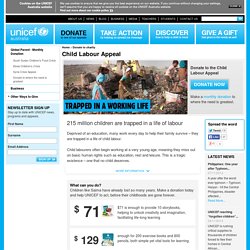
Child labourers often begin working at a very young age, meaning they miss out on basic human rights such as education, rest and leisure. This is a tragic existence – one that no child deserves. Watch Child labour - we've still got a long way to go Click here to watch A worldwide issue: 215 million children Even more shocking, 53 per cent of children engaged in child labour are exposed to serious hazards, including toxic chemicals, extreme temperatures, isolation, denigration, violence and repetitive tasks that put strain on their small bodies. Help fight child labour – a prison that withers capabilities and potential. Saima's story Seven-year-old Saima is one child who has already lost years of her short life to child labour. Saima’s mother makes a meager living collecting plastic on the rubbish dump. “I would always cut my hands and legs [while working],” Saima says. No Way Out.
The Conservatives lay out plans to override European human rights rulings. Riding high on their positive party conference mood, the Tories have decided to announce one of their main policy pledges this week: scrapping the Human Rights Act and overriding Strasbourg decisions.
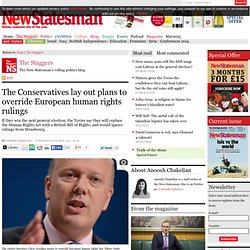
It’s something the party has long been obsessed with, the pledge to replace the Human Rights Act with a UK Bill of Rights appearing in its 2010 election manifesto. Going into coalition with the Lib Dems, who are unsurprisingly opposed to such plans, meant the Tories could not achieve their aim in this parliament. They intend to embark upon these plans if they win a majority in 2015. The party’s idea is to scrap the Human Rights Act, replace it with a so-called homegrown Bill, and to stop British laws being overruled by the European Court of Human Rights in Strasbourg. The Tories have also highlighted that they would be prepared to leave the European Convention on Human Rights altogether, if that is what it takes to curb Strasbourg’s powers.
Morocco: Unjustly Jailed Rapper To Go Free. (Casablanca) – Othman Atiq, a 17-year-old Moroccan rapper known as “Mr.
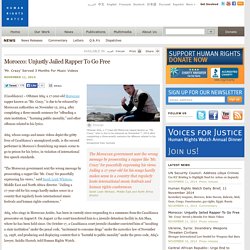
Crazy,” is due to be released by Moroccan authorities on November 12, 2014, after completing a three-month sentence for “offending a state institution,” “harming public morality,” and other offenses related to his lyrics. Atiq, whose songs and music videos depict the gritty lives of Casablanca’s unemployed youth, is the second performer in Morocco’s flourishing rap music scene to go to prison for his lyrics, in violation of international free speech standards. “The Moroccan government sent the wrong message by prosecuting a rapper like ‘Mr. Crazy’ for peacefully expressing his views,” said Sarah Leah Whitson, Middle East and North Africa director. “Jailing a 17-year-old for his songs hardly makes sense in a country that regularly hosts international music festivals and human rights conferences.”
The video for “Aqliya Mhabsa” depicts a young man in a milieu of drug-dealing and petty crime who ends up behind bars. US: Child Workers in Danger on Tobacco Farms. US: Tobacco Giant’s Move Could Reduce Child Labor. The tobacco giant Philip Morris International has adopted a change in policy that could protect many child workers from danger on tobacco farms in the United States.
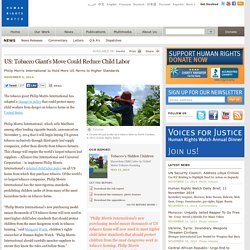
Philip Morris International, which sells Marlboro among other leading cigarette brands, announced on November 5, 2014 that it will begin buying US-grown tobacco exclusively through third-party leaf supply companies, rather than directly from tobacco farmers. This change will require the world’s largest tobacco leaf suppliers – Alliance One International and Universal Corporation – to implement Philip Morris International’s detailed child labor policy on all US farms from which they purchase tobacco.
Of the world’s 10 largest tobacco companies, Philip Morris International has the most rigorous standards, prohibiting children under 18 from many of the most hazardous tasks on tobacco farms. Universal Corporation is the world’s largest leaf merchant company, handling 25 to 35 percent of the tobacco produced in North America. What has the Human Rights Act done for us? Quite a lot, as it turns out. Some papers have welcomed Conservative plans to scrap the Human Rights Act and relegate the European Court of Human Rights to an advisory body.
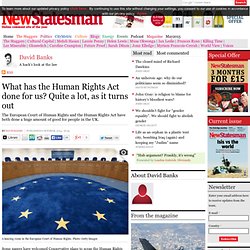
The HRA and ECHR, they think, have only ever given succour to terrorism suspects, minorities and asylum seekers with a cat*. What, they ask - and with apologies to Monty Python - has the Human Rights Act ever done for us? Well, if you are a journalist, quite a lot really: 1. It protects your sources, and it protects you when you try to protect them.When Sally Murrer, a reporter on the Milton Keynes Citizen faced trial in which evidence had been obtained by police bugging, the case was thrown out because her rights under the ECHR and HRA had been violated.
When Alex Thomson, Lena Ferguson and Toby Harnden all faced contempt proceedings following their refusal to reveal source to the Bloody Sunday Inquiry, the threats came to naught, because, among other things, they were nailed on to appeal it to the ECHR. 2. 3. 4.